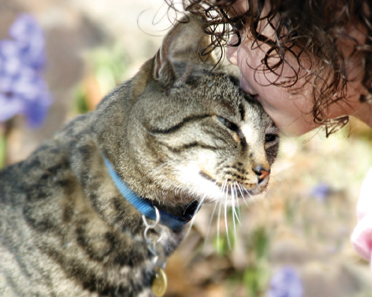Toxoplasmosis
Feline Toxoplasmosis
Toxoplasmosis is a parasitic disease that can affect most animals. Cats, however, are the only animal in which the parasite can complete its life cycle. Cats become infected by Toxoplasma gondii by eating the immature forms of the parasite contained within the muscle or organ tissue of other infected animals, such as mice.
Those immature forms, or cysts, mature inside the cat’s intestines and are excreted in the cat’s feces. If another animal—including a human---inadvertently consumes those feces, they will be come infected with toxoplasmosis.
Because toxoplasmosis is a disease that can be transmitted to people, it is particularly important to understand how infection can occur and what steps can be taken to minimize risks. If cats are infected, they can be contagious to people during a three-week period of time. The disease is transmitted if people accidentally consume cat fecal material that contains the organism. Toxoplasmosis is only infectious in feces that are at least 24 hours old. People also can become infected when they eat contaminated raw or undercooked meats, such as beef, pork or lamb.
How will toxoplasmosis affect my cat?
Cats who have been infected with toxoplasmosis will frequently have no symptoms. A smaller number of cats might develop diarrhea, or respiratory problems, or even problems with their eyes. The majority of cats, though, will be permanently infected with the parasite and show no outward signs of illness. A tiny percentage of cats infected with toxoplasmosis will die from an overwhelming infection.
How do I prevent my cat from getting toxoplasmosis?
Preventing your cats from hunting and consuming other animals will minimize their risk of contracting this parasite, as will keeping them indoors. Any raw meat is potentially contaminated with Toxoplasma gondii, so all meat fed to your cat must be thoroughly cooked. Cats can also become infected by contact with the feces of cats who are excreting the organism. Cleaning the litter box on a daily basis will decrease the likelihood of that form of transmission.
Can humans be harmed by toxoplasmosis?
Toxoplasmosis can be a serious disease in humans. Although many people have no symptoms associated with being infected, the disease is of particular concern because of its potential for significant damage to the developing babies of pregnant women. People who have a compromised immune system, which can occur during chemotherapy or with any chronic illness, such as HIV/AIDS, or diabetes, are also at risk. People become infected by inadvertently ingesting the organism in the contaminated feces of infected cats, and also through eating raw or undercooked meats that contain the parasite’s immature forms. The risk of contracting toxoplasmosis can be diminished by thoroughly cooking foods, and also by avoiding contact with infectious cat feces. It is perfectly safe to keep cats, and there is no need for pregnant women to avoid contact with their cats! Safe habits include cleaning the litter box daily, avoiding contact with cat feces (either in the litter box or during gardening or other activities that can expose cat feces), and not consuming raw or undercooked meats.
For veterinary professionals, more detailed information on this parasitic disease can be found at https://www.capcvet.org/guidelines/toxoplasma-gondii/.
Did you know?
- Toxoplasmosis can be transmitted to humans. Pregnant women and people who have compromised immune systems should always take precautions to avoid infection.
- Most cats who are infected with toxoplasmosis will not become sick.
- Stopping cats from hunting and eating raw meat will help prevent infection with toxoplasmosis.
- People become infected with toxoplasmosis when they consume contaminated undercooked or raw meat, or ingest infectious cat feces.
Learn More about Specific Parasites
- Overview
- Coccidia
- Dandruff
- Ear Mites
- Fleas
- Heartworms
- Hookworms
- Mange
- Roundworms
- Tapeworms
- Ticks
- Toxoplasmosis
Ask Your Veterinarian
Even if your cat shows no symptoms, it may carry toxoplasmosis and pass infectious material in its feces (stools). This can be dangerous to immune-compromised individuals or to developing babies in pregnant women. However, if you clean your cat box on a daily basis (without touching the litter), you should be safe. At-risk individuals can use disposable litter pans.